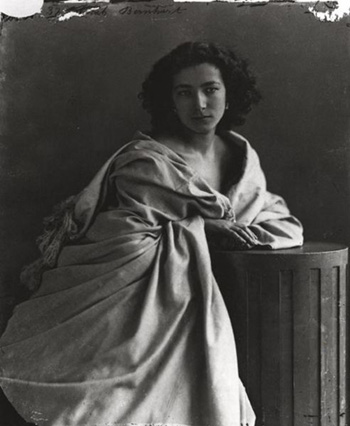Sarah Bernhardt, My Double Life Sarah Berhardt, the most celebrated French actress of the century, devoted a section of her autobiography to her experiences in Paris during the Franco-Prussian War
Evil days then came upon us. Paris began to get feverish and excited. The streets were black with groups of people, discussing and gesticulating. And all this noise was only the echo of far-distant groups gathered together in German streets. These other groups were yelling, gesticulating, and discussing, but—they knew, whilst we did not know! I could not keep calm, but was extremely excited, until finally I was ill. War was declared, and I hate war! It exasperates me and makes me shudder from head to foot. At times I used to spring up terrified, upset by the distant cries of human voices. . . . |
Photograph or Sarah Bernhardt by Nadar (1865) |
On July 19 war was seriously declared, and Paris then became the theatre of the most touching and burlesque scenes. Excitable and delicate as I was, I could not bear the sight of all these young men gone wild, who were yelling the "Marseillaise" and rushing along the streets in close file, shouting over and over again, "To Berlin! To Berlin!"
My heart used to beat wildly, for I too thought that they were going to Berlin. I understood the fury they felt, for these people had provoked us without plausible reasons, but at the same time it seemed to me that they were getting ready for this great deed without sufficient respect and dignity. My own impotence made me feel rebellious, and when I saw all the mothers, with pale faces and eyes swollen with crying, holding their boys in their arms and kissing them in despair, the most frightful anguish seemed to choke me. I cried, too, almost unceasingly, and I was wearing myself away with anxiety, but I did not foresee the horrible catastrophe that was to take place. . . .
The war news led us to hope for victory. There was great joy and a certain emotion felt by every one on hearing that the young Prince Imperial had received his baptism of fire at Saarbruck, in the engagement commanded by General Frossard.
Life seemed to me beautiful again, for I had great confidence in the issue of the war. I pitied the Germans for having embarked on such an adventure. But, alas! the fine, glorious progress which my brain had been so active in imagining was cut short by the atrocious news from Saint-Privat. The political news was posted up every day in the little garden of the Casino at Eaux-Bonnes. The public went there to get information. Detesting, as I did, tranquillity, I used to send my man-servant to copy the telegrams. Oh, how grievous was that terrible telegram from Saint-Privat, informing us laconically of the frightful butchery; of the heroic defence of Marshal Canrobert; and of Bazaine's first treachery in not going to the rescue of his comrade.
I knew Canrobert, and was very fond of him. Later on he became one of my faithful friends, and I shall always remember the exquisite hours spent in listening to his accounts of the bravery of others—never of his own. And what an abundance of anecdotes, what wit, what charm!
This news of the battle of Saint-Privat caused my feverishness to return. My sleep was full of nightmares, and I had a relapse. The news was worse every day. After Saint-Privat came Gravelotte, where 36,000 men, French and German, were cut down in a few hours. Then came the sublime but powerless efforts of MacMahon, who was driven back as far as Sedan; and finally Sedan.
Sedan! Ah, the horrible awakening! The month of August had finished the night before, amidst a tumult of weapons and dying groans. But the groans of the dying men were mingled still with hopeful cries. But the month of September was cursed from its very birth. Its first war-cry was stifled back by the brutal and cowardly hand of Destiny.
A hundred thousand men! A hundred thousand Frenchmen compelled to capitulate, and the Emperor of France forced to hand his sword over to the King of Prussia!
Ah! that cry of grief, that cry of rage, uttered by the whole nation. It can never be forgotten!
On September 1, towards ten o'clock, Claude, my man-servant, knocked at my door. I was not asleep, and he gave me a copy of the first telegrams:"Battle of Sedan commenced. MacMahon wounded," &c. &c.
"Ah! go back again," I said, "and as soon as a fresh telegram comes, bring me the news. I feel that something unheard of, something great and quite different, is going to happen. We have suffered so terribly this last month, that there can only be something good now, something fine, for God's scales mete out joy and suffering equally. Go at once, Claude," I added, and then, full of confidence, I soon fell asleep again, and was so tired that I slept until one o'clock. When I awoke, my maid Félicie, the most delightful girl imaginable, was seated near my bed. Her pretty face and her large dark eyes were so mournful that my heart stopped beating. I gazed at her anxiously, and she put into my hands the copy of the last telegram:"The Emperor Napoleon has just handed over his sword…."
Blood rushed to my head, and my lungs were too weak to control its flow. I lay back on my pillow, and the blood escaped through my lips with the groans of my whole being. . . .
